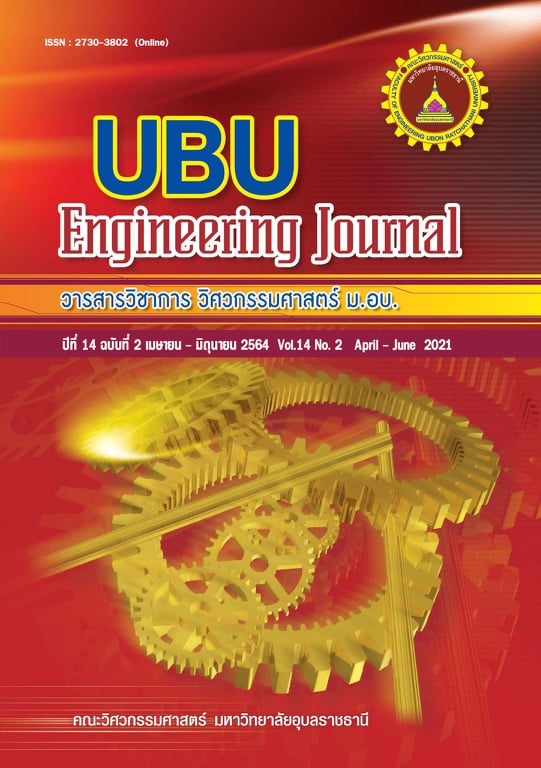Part receiving scheduling for a truck manufacturing company
Main Article Content
Abstract
Truck manufacturing industry is one of the most important industries in Thailand. This industry impact to not only national economy but also an employment rate. Nowadays, a number of truck manufacturers (small, medium and large sizes) tend to increase which result in a higher competitive environment. Every manufacturer should improve their operation so as to be able to compete in an efficient way. Generally,each truck comprises of a large number of parts with many sizes. So, part receiving is the important process both part receiving planning and daily part receiving scheduling. If part receiving scheduling is not appropriate managed, there will be large number of supplier’s trucks waiting at a stop point in front of a warehouse which is very hard to control. Moreover, this waiting can delay other supplier delivery schedules. From data collection, it is found that, in a case study company, an averaged waiting time of supplier’s trucks is equal to 1,409 minute. This research aims to study and improve part receiving scheduling method for a case study company. The objective is to reduce total waiting time of part suppliers. The experiment is conducted to test an efficiency and effectiveness of 5 scheduling rules (Current Order(CO), Longest Processing Time(LPT), Shortest Processing Time(SPT), Lowest Standard Deviation(LSD) และ Highest and Lowest Standard Deviation(HLSD)). In this experiment, the part supply data in Monday which is the heaviest traffic day. It is found that the Lowest Standard Deviation (LSD) method result in a schedule with the lowest total waiting time. With LSD method, a total waiting time is reduced from 1,909.1 minute to 3.0 minute which is equal to 99.84% and the maximum waiting time is reduced from 94.1 minute to 4.3 minute which is equal to 95.43%.
Article Details
References
[2] Shim S-O, Kim Y-D. A branch and bound algorithm for an identical parallel machine scheduling problem with a job splitting property. Computers & Operations Research. 2008;35(3):863-75.
[3] Baker KR. Introduction to Sequencing and Scheduling: New York: John Wiley & Sons; 1974.
[4] Sangarun P. Production scheduling : the case study of compressor manufacturing.Chulalongkorn university; 2002.
[5] Yuthanasewin T. Productivity improvement with master production scheduling : a case study of water cooler factory.King monkut's institute of technology north bangkok 2006.
[6] Sripanich N. Production planning and scheduling for customer requirement : a case study the jewelry factory. King monkut's institute of technology north bangkok 2006.
[7] Boonman A. To planning and scheduling for productivity improvement by applying the microsoft project program.King monkut's institute of technology north bangkok 2008.
[8] Nakpathom Y.A study of job shop production scheduling on textile industry.Silapakorn university.
[9] Haoxun C, Chengbin C, J.-M. P. An improvement of the lagrangcan relaxation approach for job shop scheduling: a dynamic programming method. IEEE Transections on robotics and automation.1998;14(5):786 - 795
[10] Hiroshi O, Nakatani H. A heuristic job-shop scheduling algolithm to minimize the total holding cost of completed and in-process product subject to no tardy jobs. International Journal of Production Economics.2006;101(1): 19-29
[11.]Alvarez-Valdes R, Fuertes A, Tamarit JM, Gimenez G, Ramos R.A heuristic to schedule flexible job-shop in a glass factory. European Journal of Operational Research. 2005;165 (2): 525–534
[12] Ridvan B, Mehmet Y, Zafer O. Automatic generation of production scheduling models in single stage multi-product batch plants: Some examples. Mathematical and Computer Modelling.2007; 46(1–2):69-79
[13] Alessandro M, Dario P. Job-shop scheduling with blocking and no-wait constraints. European Journal of Operational Research. 2002; 143(3): 498-517
[14] Mokotoff E. Parallel machine scheduling problems: A survey. Asia-Pacific Journal of Operational Research. 2001;18(2)
[15] Pinedo ML. Scheduling : Theory, Algorithms, and Systems: Springer; 2012.

